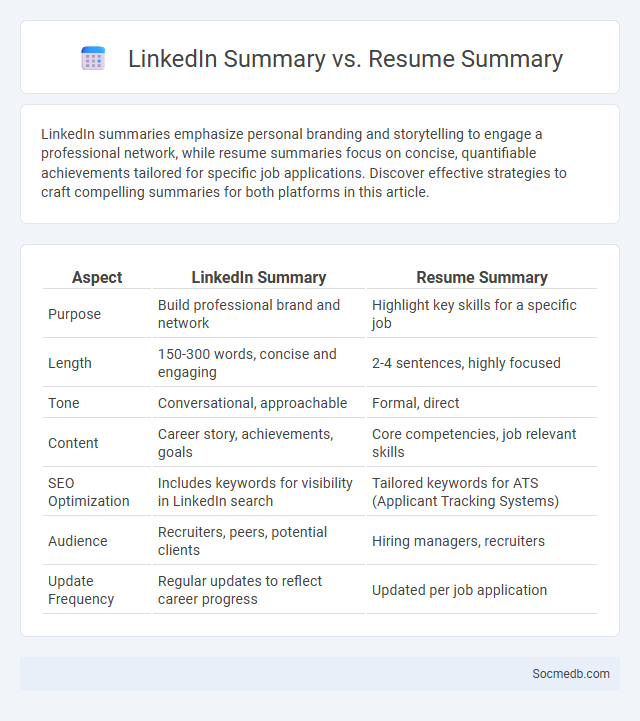
Photo illustration: LinkedIn Summary vs Resume Summary
LinkedIn summaries emphasize personal branding and storytelling to engage a professional network, while resume summaries focus on concise, quantifiable achievements tailored for specific job applications. Discover effective strategies to craft compelling summaries for both platforms in this article.
Table of Comparison
| Aspect | LinkedIn Summary | Resume Summary |
|---|---|---|
| Purpose | Build professional brand and network | Highlight key skills for a specific job |
| Length | 150-300 words, concise and engaging | 2-4 sentences, highly focused |
| Tone | Conversational, approachable | Formal, direct |
| Content | Career story, achievements, goals | Core competencies, job relevant skills |
| SEO Optimization | Includes keywords for visibility in LinkedIn search | Tailored keywords for ATS (Applicant Tracking Systems) |
| Audience | Recruiters, peers, potential clients | Hiring managers, recruiters |
| Update Frequency | Regular updates to reflect career progress | Updated per job application |
Understanding LinkedIn Summaries: Purpose and Impact
LinkedIn summaries serve as a strategic platform for professionals to showcase their expertise, career goals, and unique value propositions to potential employers and collaborators. Crafting an optimized summary with relevant keywords enhances visibility in search results, increasing networking opportunities and job prospects. A compelling summary not only reflects personal brand identity but also drives engagement by resonating with industry-specific audiences and highlighting measurable achievements.
What Is a Resume Summary? Key Elements Explained
A resume summary is a concise statement highlighting a candidate's most relevant skills, experiences, and achievements tailored for social media roles. Key elements include specific social media platforms expertise, measurable results like increased engagement or follower growth, and soft skills such as communication and creativity. This summary helps recruiters quickly assess a candidate's value in managing brand presence and driving online campaigns effectively.
Core Differences Between LinkedIn and Resume Summaries
LinkedIn summaries emphasize personal branding, showcasing your professional story, skills, and accomplishments in a conversational tone to engage a broad network, while resume summaries provide a concise, targeted overview of your qualifications tailored to specific job applications. Your LinkedIn profile allows you to include multimedia content and endorsements, enhancing credibility and visibility, whereas a resume summary is text-based, optimized for applicant tracking systems (ATS) to highlight relevant keywords and achievements. Understanding these core differences helps you leverage LinkedIn for networking and career growth, while crafting effective resume summaries that appeal directly to hiring managers.
Audience Targeting: LinkedIn vs. Resume Summaries
LinkedIn offers advanced audience targeting tools that allow you to connect with specific professionals based on industry, job title, location, and skills, enhancing your networking potential and job search effectiveness. In contrast, resume summaries must be concise and tailored to attract hiring managers by highlighting your key strengths and achievements relevant to the desired position. Optimizing your LinkedIn profile and resume summary together maximizes your visibility to recruiters and aligns your professional brand with your career goals.
Tone and Voice: Professional Branding Across Platforms
Maintaining a consistent professional tone and voice across social media platforms establishes Your brand's credibility and fosters trust with your audience. Tailoring content style to fit each platform while preserving core messaging ensures effective engagement and reinforces Your brand identity. Clear, authoritative communication demonstrates expertise that differentiates Your brand in competitive digital spaces.
Resume Optimization: Best Practices for Modern Job Searches
Optimizing your resume for social media platforms like LinkedIn involves incorporating relevant keywords and industry-specific terms that applicant tracking systems (ATS) prioritize. Highlighting quantifiable achievements and utilizing a clean, easy-to-read format enhances visibility and appeal to recruiters. Regularly updating your profile with current skills, endorsements, and professional summaries aligns with modern job search algorithms, increasing your chances of being discovered by hiring managers.
Keywords: Maximizing Visibility on LinkedIn and Resumes
Maximizing visibility on LinkedIn and resumes involves strategically incorporating relevant industry keywords and action verbs to capture recruiters' attention. You should tailor your LinkedIn profile and resume content to reflect trending skills, certifications, and achievements aligned with your career goals. Optimizing keyword density enhances searchability, increasing the likelihood of appearing in recruiter searches and automated applicant tracking systems.
Formatting Strategies for LinkedIn vs. Resumes
Formatting strategies for LinkedIn prioritize concise, keyword-rich summaries and engaging multimedia content to boost visibility in searches and attract recruiters. Resumes demand structured layouts with bullet points and quantified achievements for quick scanning by hiring managers and applicant tracking systems. Tailor your content to leverage LinkedIn's interactive features while maintaining clarity and precision on your resume to optimize professional impact.
Common Mistakes to Avoid in Summaries and Resumes
Common mistakes to avoid in social media summaries and resumes include overusing buzzwords like "innovative" or "team player," which can dilute the impact of your profile. Avoid vague descriptions; instead, use specific metrics and accomplishments to demonstrate your skills and achievements. Neglecting to tailor your summary or resume to the target platform or job role can reduce your chances of standing out to recruiters or potential connections.
Actionable Tips for Optimizing Your Career Profiles
Enhance your social media career profiles by using industry-specific keywords to improve search visibility and attract relevant recruiters. Regularly update your achievements and skills with quantifiable results, such as percentage growth or project completions, to demonstrate impact effectively. Incorporate a professional profile photo and a tailored headline that reflects your expertise and career goals to increase profile engagement.
 socmedb.com
socmedb.com